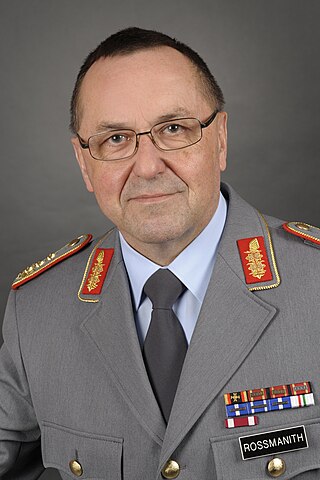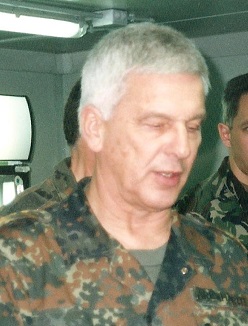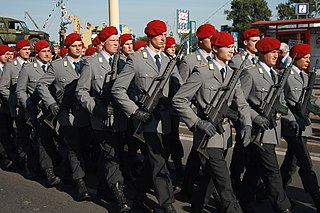
The Bundeswehr is the armed forces of the Federal Republic of Germany. The Bundeswehr is divided into a military part and a civil part, the military part consisting of the German Army, the German Navy, the German Air Force, the Joint Support Service, the Joint Medical Service, and the Cyber and Information Domain Service.
Eurocorps, located in the French city of Strasbourg (Bas-Rhin), is a multinational corps headquarters. Founded by France and Germany in 1992, it is today composed of personnel from six framework nations and five associated nations. The framework nations place the Eurocorps at the service of the European Union (EU) and NATO, which certified it in 2002 as one of its nine High Readiness Land Headquarters.

The German Army is the land component of the armed forces of Germany. The present-day German Army was founded in 1955 as part of the newly formed West German Bundeswehr together with the Marine and the Luftwaffe. As of 2024, the German Army had a strength of 63,047 soldiers.

The Kosovo Force (KFOR) is a NATO-led international peacekeeping force and military of Kosovo. KFOR is the third security responder, after the Kosovo Police and the EU Rule of Law (EULEX) mission, respectively, with whom NATO peacekeeping forces work in close coordination. Its operations are gradually reducing until the Kosovo Security Force, established in 2009, becomes self-sufficient.

Albert Bryant Jr. is a retired United States Army brigadier general, best known for service as the Chief of Western Hemisphere Operations during and in the aftermath of the September 11 attacks and for his tenure as the Assistant Division Commander of the 4th Infantry Division at the time of the division's detection and capture of deposed Iraqi president Saddam Hussein. Bryant also served as the Deputy Commander of Fort Knox, Kentucky, and the United States Army's Armor School. As Chief of Staff of NATO's Kosovo Force (KFOR), Bryant was the highest ranking American general on the KFOR leadership team in the lead up to Kosovo independence.
The 10th Panzer Division is an armoured division of the German Army, part of the Bundeswehr. Its staff is based at Veitshöchheim. The division is a unit of the German Army's stabilization forces and specializes in conflicts of low intensity.

The relations between Federal Republic of Germany and the Republic of Kosovo. When Kosovo declared independence in 2008, Germany was among the first countries to officially recognize it 20 February 2008 and establish diplomatic relations. Germany has an embassy in Pristina since 27 February 2008. Kosovo has an embassy in Berlin and consulates in Frankfurt, Stuttgart ,Munich, Düsseldorf and Leipzig.

The Kosovo Security Force (KSF) is the military of Kosovo. The KSF is tasked with defending the sovereignty and territorial integrity of Kosovo, military support for civilian authorities, and participation in international peacekeeping missions and operations. Since 2018, it is in the process of transforming into the Kosovo Armed Forces.

The 9th Panzerlehr Brigade is a formation of about 6,000 men strong within the German Armed Forces or Bundeswehr, which is subordinated to the 1st Panzer Division in Oldenburg. The bulk of the brigade is stationed in Munster. Two battalions are based in Neustadt am Rübenberge. The brigade has become the "showcase of the German Army" as a result of its German Army Combat Vehicle and Aircraft Demonstration Exercises which it has conducted for decades. These exercises demonstrate the capability of the Army's fighting vehicles and aircraft and how they operate jointly in various scenarios. The formation is classified as an armoured brigade within the Bundeswehr's heavy forces.

Volker Wieker is the former Chief of Staff of the Bundeswehr, the German armed forces, and a general of the German Army. Trained as an artillery officer, Wieker served in every major foreign Bundeswehr deployment since 1996, including Bosnia, Kosovo and Afghanistan.
The Army Forces Command in Falckenstein Barracks in Koblenz was one of the two leadership pillars of the German Army, together with the German Army Office, before it was merged into the Army Command.

Headquarters Allied Force Command Heidelberg was a Military formation of the North Atlantic Treaty Organization (NATO) responsible for providing deployable joint staff elements (DJSE) in support of NATO operations worldwide. It was headquartered at Campbell Barracks, Germany, and reported to the Joint Force Command Brunssum (JFCBS). During the War in Afghanistan, it provided command and control elements to the International Security Assistance Force (ISAF). It was disbanded on 1 April 2013.

The incident at the Pristina airport was a military confrontation between the forces of Russia and NATO on 12 June 1999, following the end of the Kosovo War. Russian troops unexpectedly occupied the airport ahead of a planned NATO deployment, creating a tense stand-off. The conflict was resolved through a peaceful agreement, but also due to the potential threat posed by the Kosovo Liberation Army (KLA), which opposed the Russian presence and could have escalated the situation further.

Lieutenant General Richard Rossmanith is a German Army officer and currently Commander of the Multinational Joint Headquarters Ulm in Ulm, Germany.

Klaus Reinhardt was a German Army general. He was the commander of the German Army Forces Command, the NATO Joint Headquarters Center, and KFOR in Kosovo. Reinhardt died on 30 November 2021, at the age of 80. He was the son of Nazi bureaucrat Fritz Reinhardt.

General Hans-Lothar Domröse is a senior German Army officer, former Commander of Allied Joint Force Command Brunssum.

The Fernmeldetruppe is the military communications arm of service in the German Army and in the Joint Support Service of the Bundeswehr. The Fernmeldetruppe is one of the Combat Support arms. The Army Telecommunications Force is responsible for the operation of the Army's communications and information network.

General Leif Michael Claesson is a Swedish Army officer. He currently serves as the Chief of Defence since 1 October 2024. Claesson began his military career in 1984 as a tank commander. He advanced through various positions, including instructor and company commander, while completing education at military institutions in Sweden and Germany. By 2001, he became a lieutenant colonel, serving in both national and international roles, including as a military adviser and representative to NATO and the EU. Promoted to brigadier general in 2013, Claesson held key leadership roles, such as commanding the Swedish ISAF contingent in Afghanistan and overseeing Nordic Battlegroup training. In 2018, he became a major general and Chief of Policy and Plans Department, later serving as Chief of Joint Operations and Commandant General in Stockholm in 2020. Promoted to lieutenant general, he became Chief of the Defence Staff in 2023. Finally, in 2024, he was appointed general and Chief of Defence, assuming the role on 1 October 2024.

Carsten Breuer is a German Army general who serves as the incumbent Inspector General of the Bundeswehr. Prior to his appointment to the post, Breuer served as the first commander of the Bundeswehr Homeland Defence Command and is also known for his role as commander of the COVID-19 Task Force. Breuer also served as commander of the Bundeswehr Territorial Command, the 37 Armoured Infantry Brigade and the 12 Armoured Air Defence Gun Battalion.
Helmut Harff was a German Army brigadier general who served as commander of German military contingents taking part in peacekeeping operations in Somalia and Kosovo, and was chief of staff of the French-led Multi-National Division Southeast in Bosnia-Herzegovina. He was described as one of the most experienced Bundeswehr officers when it began undertaking foreign missions in the 1990s.















